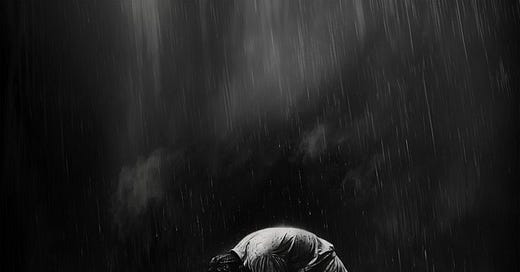You smile at the wind I shudder at
for the wight of death is my only glazier.
After you are done with your exams, after you have had your hot supper and are full, after the money has come, after the rent has been paid and you owe no debts, when no part of your body is aching and you have no pains, when your heart hasn't yet been broken and nothing brings tears to your eyes, when it is half past seven and then it begins to rain, you put on your fluffy jacket, clasp your arms around your chest for warmth and saunter to the window, “what a beautiful night! and how sweet it would be under my blankets!” It thunders, and you move a step back, but in awe rather than in fear. Don't we have such a marvelous creator? Oh such splendor!
In your warm coat you watch gladly as the mighty wind Euroclydon whirls chillingly and swings branches, yet do you not see, that in judging this tempestuous wind, it maketh a marvelous difference whether thou lookest at it from a glass window where the frost is all on the outside, or whether thou observest it from a sashless window where the frost is on both sides, and of which the wight of death is the only glazier.1
You, with the rich man, cry cheerfully: “What a fine frosty night!” while poor Lazarus lies chattering his teeth against the curbstone for his pillow, and shaking off his tatters with his shiverings, he might plug up both ears with rags, and put a corn-cob in his mouth, yet that would not keep out the tempestuous Euroclydon.2
It is a fine storm, one that makes us long for our beds, which indeed we soon afterwards curl ourselves in, but outside the safety of our thick brick walls and glazed windows, Lazarus shivers as though palsied, wishing we could spare him a tablecloth for a blanket, for his rags are as nothing. Sitting on the deluged floor, poor Lazarus doesn't share in the sentiments we fancy towards the storm.
You watch it all with a smile, your heart at peace, in want of nothing, perhaps only worried you now have to put off the picnic you planned for tomorrow. At nine o'clock, you hear it in the news that a mother's only child has been carried away by the flood, how sad to think of it, but you forget it the next moment because you cannot bear to hold on to such dreary imaginings. Yet what of those who have no option but to sit with the dreariness you chide so much?
Homeless, hungry, drenched, shaking, yet sweating so intensely on account of a debilitating fever, I don’t regard such happenings as proof of the Creator’s glory, to me they are the evidence of his wrath and indifference, for what are my sins that he shouts at me with such shrieking a thunder? The cold mighty wind seems a pleasant zephyr to you who are indoors, but to me it is no comforter, the deluge is not kind, and I have stopped longing for a bed for I have finally resigned myself to the reality that I may indeed never sleep in one. You smile at the wind, but I, gnawed by fear and hunger within, and nipped by cold without, shudder at it, for the wight of death is my only glazier.
Those who are at ease have contempt for misfortune Job 12:5 NIV
Moby-Dick by Herman Melville
I am reading Moby-Dick together with a few friends and this post here, that reads almost like a diary entry, was inspired by it. Melville sentences are so beautiful, and so clever. His allusions are also so arresting, and the lessons? Timeless.
Ibid.





